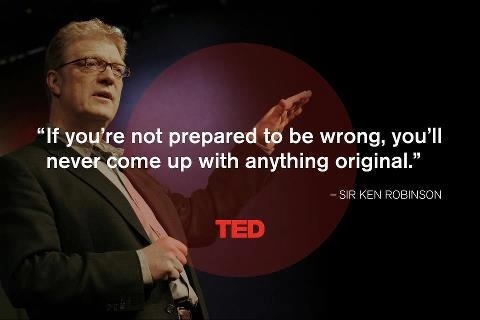I love this quote from Sir Ken. Makes sense doesn’t it?
Why then, do so many frown on imperfection and the consequences of getting things wrong and making mistakes? Despite our contemporary rhetoric of the virtues of tolerating diverse views, ideas and beliefs, an intolerance of “error” seems to remain in many walks of life and is especially prevalent within the cultures of a lot of our businesses.
I think part of this comes from our steadily increasing expectations around efficiency, optimisation and getting things right first time.
Don’t get me wrong (pardon the pun), I’m a firm believer that it’s good to strive for the best, to do and be our best as individuals, teams, groups and organisations. The irony is that in order to bring this about, we have to be brave enough to make mistakes and get things wrong. As long as we then learn from the experience and adjust, we’ll continue to move forwards towards getting things right!
So getting things wrong and “failing” are important.
Leo Babauta says “Failures are the stepping stones to success. Without failure, we’ll never learn how to succeed. So try to fail, instead of trying to avoid failure through fear”
And if we want to feed originality, which after all, forms the backbone of progress and growth, then fear may well come into the equation. To succeed, we need to feel it (not ignore it) and develop the strength to “do it anyway”. Susan Jeffries has great wisdom on this and her best selling book makes for a powerful read !
Reflecting further on Sir Ken’s quote, I believe that coming up with something original is as much about developing ourselves as it is a new idea, product or concept. Every day we have the opportunity to reflect and release something new in our potential. To explore something about ourselves that we hadn’t touched before.
It also means we’ll get ourselves wrong sometimes.
This can be painful. It can also provide us with rich opportunities for learning more about what makes us tick.
Take a look at the last week, for example. I bet if we think hard enough, we can find something original that we did or thought, evaluate whether we were correct or incorrect about it and then (particularly if the latter) derive some learning from the experience.
By doing this we can exercise our original thinking by encouraging ourselves to develop a more fearless attitude to getting things wrong – in a right kind of way !

Indeed! The key point here, I think, is about learning from getting things wrong – which is why I love your point, Frank, about the opportunity to explore ourselves in a way which releases something new from our pool of untapped potential.
There’s no question that there’s virtue in stirving for excellence . That’s different, though, from being hung up about always getting things right, which carries the risk of not risking anything and crushing the creativity which can lead to even more excellent excellence.
I’ve noticed in the past the greater readiness of the US to fund research and development by people who show they merit the funding because they’ve failed before rather than (as we tend to do in the UK) passing a negative judgment on them if they’ve failed. I wonder if this is part of the reason for rhe US’s energetically entrepreneurial society?
Being ready to fail – or even to not reach 100% perfection – may be our most useful and inspiring route towards achieving brilliance. Look at the story of how Post-Its were created, for example: they were a failed attempt to create something with more stickiness. You’d hardly call them a failure now….
Thanks for your comments Lindsay. Im with you on this contrast between striving for excellence and getting paralysed by failure. Really interesting thoughts on the US mentality vs UK – I think you’re onto something there for sure.
My brother is a highly creative individual who thrives on mistakes; he doesn’t regard them as mistakes, or a failure. He shared his insights with my daughter’s Year 5 class, and the kids were wowed by his enthusiasm for not getting things right first time. For him, mistakes:
(1) are an exciting and educational part of the developmental journey;
(2) enable him to identify what isn’t working, and why;
(3) provide an opportunity to modify and improve;
(4) often result in a better idea altogether.
Each step for him is progress, no matter what the outcome, and he doesn’t get hung up on success. He just knows when something is “right”. This nicely highlights the benefits of excellence-versus-perfectionism, because we all know that perfection is unattainable.
Fantastic insight – Thank you Robyn! (and to your brother!)